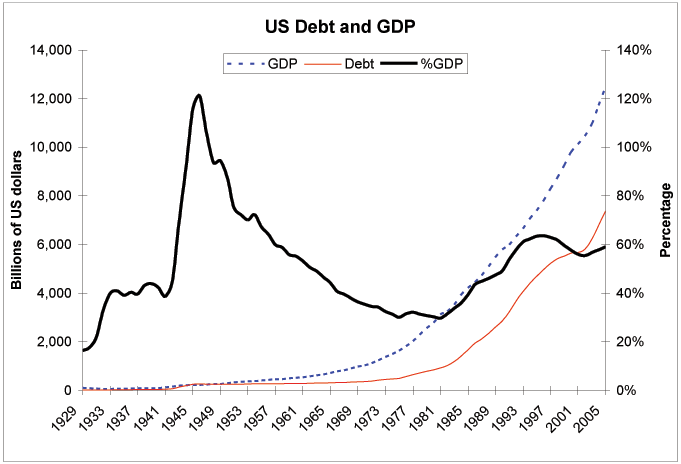How debt could sink the US economy
Many experts say we shouldn't be concerned about rising levels of US government debt - but they're wrong, says gold commentator Paul van Eeden. Higher US interest rates and a falling dollar will be an inevitable consequence of the country's soaring government spending...
Get the latest financial news, insights and expert analysis from our award-winning MoneyWeek team, to help you understand what really matters when it comes to your finances.
You are now subscribed
Your newsletter sign-up was successful
Want to add more newsletters?

Twice daily
MoneyWeek
Get the latest financial news, insights and expert analysis from our award-winning MoneyWeek team, to help you understand what really matters when it comes to your finances.

Four times a week
Look After My Bills
Sign up to our free money-saving newsletter, filled with the latest news and expert advice to help you find the best tips and deals for managing your bills. Start saving today!
Many people still don't think the amount of debt the US government has amassed is anything to worry about, most commonly because it is still inconsequential relative to the US economy.
As much as the nominal debt may have grown, the growth in the US economy has ensured that servicing and carrying the debt is not a problem.
Stated another way, the US debt as a percentage of US GDP (gross domestic product) has not grown out of hand and therefore the nominal amount of debt is nothing to worry about.
MoneyWeek
Subscribe to MoneyWeek today and get your first six magazine issues absolutely FREE

Sign up to Money Morning
Don't miss the latest investment and personal finances news, market analysis, plus money-saving tips with our free twice-daily newsletter
Don't miss the latest investment and personal finances news, market analysis, plus money-saving tips with our free twice-daily newsletter
Let us examine that proposition for a minute.
Below is a chart of the annual US GDP, the US government debt, and the US government's debt as a percentage of the US GDP.

Another interesting fact is that from around 1945 to about 1985 the US economy was growing at a faster pace than the US debt. This is evident from the decline in the debt to GDP ratio. Since 1985, however, the situation is exactly the opposite: the US debt is growing much faster than the US GDP.
The debt to GDP ratio improved during the late 1990s and the current rate of growth in the ratio is much less than it was during the eighties. But that reversal of the ratio in the late 1990s was due to the influx of foreign capital into the US and the subsequent stimulus this influx of capital had on the US economy. As a result tax receipts by the US government rose dramatically (all those capital gains during the tech bubble and stock market boom). That's over and the debt to GDP ratio is once again on the rise. Also, we have not seen the reversal of those international capital flows -- something that has been discussed at length in these pages -- and when that reversal occurs it will not only cause the dollar to decline, but will also cause the US debt to increase.
Regardless of what the Fed, the White House, the Senate or the press want you to believe, if China and Japan stop supporting the US dollar, US medium to long-term interest rates are going to rise. That would put a drag on the already anemic US economy, which means tax receipts by the US government will decline at the same time as the interest charges on the US debt will rise. The problem is that the US government is more likely to increase its deficit spending than to cut it, in an attempt to add stimulus.
The current debt to GDP ratio is almost twice as high as the debt to GDP ratio during the final stages of the Vietnam War and compared to Vietnam the US' current military adventures are skirmishes. If we combine increasing military spending with an increase in domestic deficit spending, higher interest rates and lower government tax receipts, then the debt to GDP ratio could rapidly approach World War II levels.
Anyone who is not alarmed by the increase in US government debt is living with his head in the sand.
First published on Kitco.com (www.kitco.com)
By Paul van Eeden
Paul van Eeden works primarily to find investments for his own portfolio and shares his investment ideas with subscribers to his weekly investment publication. For more information please visit his website (www.paulvaneeden.com). If you would like to read more from Paul, you can sign up to get his weekly commentary at https://www.paulvaneeden.com/commentary.php.
Get the latest financial news, insights and expert analysis from our award-winning MoneyWeek team, to help you understand what really matters when it comes to your finances.
MoneyWeek is written by a team of experienced and award-winning journalists, plus expert columnists. As well as daily digital news and features, MoneyWeek also publishes a weekly magazine, covering investing and personal finance. From share tips, pensions, gold to practical investment tips - we provide a round-up to help you make money and keep it.
-
 Can mining stocks deliver golden gains?
Can mining stocks deliver golden gains?With gold and silver prices having outperformed the stock markets last year, mining stocks can be an effective, if volatile, means of gaining exposure
-
 8 ways the ‘sandwich generation’ can protect wealth
8 ways the ‘sandwich generation’ can protect wealthPeople squeezed between caring for ageing parents and adult children or younger grandchildren – known as the ‘sandwich generation’ – are at risk of neglecting their own financial planning. Here’s how to protect yourself and your loved ones’ wealth.

